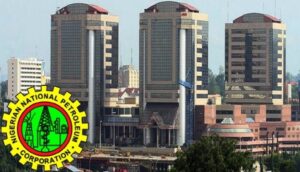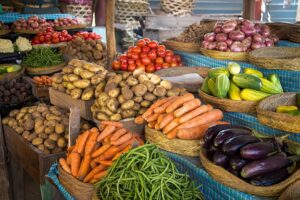CONTENTS
-
NNPCL DEBT/PETROL PRICE HIKE
-
DANGOTE REFINERY
-
DOLLAR BONDS
-
MARKET TRENDS
-
POS INNOVATION
NNPCL DEBT

Nigeria’s N4.56 Trillion Debt to NNPCL for Subsidized Petrol Sales
The Nigerian National Petroleum Company Limited (NNPCL) has brought to light a significant financial burden on the nation, revealing that Nigeria owes N4.56 trillion. This debt is the result of selling petrol at subsidized prices between August 2023 and June 2024, as disclosed in recent Federal Account Allocation Committee (FAAC) meetings.
The Root Cause of the Debt
According to the FAAC Post-Mortem Sub-Committee (PMSC), the outstanding amount is attributed to unrecovered funds due to exchange rate differentials on Premium Motor Spirit (PMS) imports. As of May 2024, the unrecovered sum was N4.34 trillion, which swelled to N4.56 trillion by June 2024.
RMAFC’s Demand for Transparency and State’s Demand for Accountability
To address the growing debt, the Chairman of the Revenue Mobilization Allocation and Fiscal Commission (RMAFC), who led the subcommittee meeting, has requested comprehensive details from NNPCL. This includes the volume of PMS imported, pricing structure, and sales values to justify the weighted exchange rate applied in the billing process.
The debt claim by NNPCL has raised concerns among state finance commissioners, leading to calls for greater transparency. During an FAAC meeting, Akwa Ibom State’s Commissioner of Finance sought clarity on the debt and its potential impact. Representatives from Delta and Bayelsa States also expressed the need for NNPCL to operate more independently and manage its transactions without relying heavily on the Federation Account.
Although President Bola Tinubu announced the removal of fuel subsidies in May 2023, evidence suggests that the government continues to bear substantial costs. Despite official denials, NNPCL’s Chief Financial Officer, Alhaji Umar Ajiya, revealed that the government compensates the company for selling PMS at half the landing cost, a shortfall rather than a direct subsidy.
NNPCL’s financial statement for the fiscal year ending December 31, 2023, highlighted that the federal government accumulated a debt of N5.1 trillion in under-recovery and energy security expenses related to fuel imports. This amount includes N3.3 trillion in under-recovery from January to May 2023 and N1.8 trillion in energy security expenses from August to December 2023.
The Need for a Long-Term Solution
As Nigeria grapples with this immense financial obligation, the need for a sustainable solution becomes increasingly urgent. The discussions around NNPCL’s operations and the broader economic impact of fuel subsidies underscore the complexities of managing the nation’s energy sector and its financial health.
NNPCL raises petrol Price to NGN 897
The retail arm of the Nigerian National Petroleum Company has announced an increase in the price of premium motor spirit (petrol) from N617/itre to N897/liter effective today, September 3, 2024.
This is coming barely 48 hours of the Dangote refinery’s plan to distribute its petrol in Nigeria’s market. BusinessDay findings on Tuesday showed that most retail stations of the NNPC had adjusted to the new price of between N855 to N897/litre.
The latest review however follows the recent revelation made by the NNPCL, stating that the cost of supplying petrol was putting financial strain on the company. This it said poses a threat to the country’s fuel supply sustainability.
Dangote kicks off Africa’s petrol refining renaissance
On Tuesday, Dangote Group kicked off Africa’s petrol renaissance at its giant refinery in Lekki, Lagos, providing premium motor spirit to a nation battling an acute fuel crisis. The $20 billion refinery’s commencement offers a new and potentially more efficient supply route for Nigeria’s petrol needs.
According to Aliko Dangote, president of Dangote Group, the refinery has enough capacity to satisfy the petrol demand of Nigeria and the entire sub-Saharan region of Africa.
“The capacity that we have will not only meet up with the Nigerian demand, it will meet up with the demand of sub-Saharan Africa, at least,” he said while addressing the press on Tuesday at the inspection of the 650,000 barrels per day refinery.
He added, “As you know, there’s quite a lot of what you call round-tripping, where people now do documentation and the fuel does not come into Nigeria. So right now, as we have this refinery working, it will show the true consumption of Nigeria. We can track every single loaded truck and we will try as much as possible to track the loaded ships, and trucks who can tell you where they are.”
Experts say the refinery will bring much-needed relief to Nigerians currently experiencing excruciating petrol scarcity in towns and cities nationwide.
“Our PMS can be in filling stations within the next 48 hours, depending on NNPC,” Aliko Dangote said on Tuesday. He assured Nigerians of high quality of petrol from his refinery, stating that the refinery will help to reduce problems associated with dirty fuel. We will offer good petrol while the engines of your vehicles will last longer. You will not be having an engine issue, which a lot of us were having. It won’t happen at all.”
He added, “The quality here will match that of anywhere in the world: US, America. We will make sure that nobody will beat us in terms of quality.”
Refinery to supply 25m litres
The Nigerian Midstream and Downstream Petroleum Regulatory Authority (NMDPRA) said Dangote oil refinery would supply a total of 25 million litres of petrol to the Nigerian market daily, starting from September. NMDPRA disclosed on Tuesday that this would rise to 30 million litres from September
DOLLAR BONDS

BVN and NIN Required for Nigeria’s $500 Million Domestic Dollar Bond
The Federal Government of Nigeria has introduced a new financial instrument—the Domestic FGN US Dollar Bond—requiring specific identification for participation. This move was announced through a Frequently Asked Questions (FAQ) document by the Debt Management Office (DMO) on its official website.
Identification Requirements
All Nigerian citizens, including those residing abroad, must possess a Bank Verification Number (BVN) and a National Identification Number (NIN) to subscribe to this bond, which was issued on Monday. This bond is part of a broader $2 billion program, with the government seeking to raise $500 million in this initial tranche from both local and foreign investors. Eligible participants include Nigerians living in the country, those in the diaspora with foreign exchange savings, and foreign institutional investors. The DMO clarified in the FAQ, “A BVN and NIN are required for subscription. Nigerians in diaspora can apply for both BVN and NIN if they don’t already have them.”
Payment Methods
The DMO’s FAQ also outlines that subscriptions to the Domestic FGN US Dollar Bond cannot be made in cash. All payments must be processed through electronic transfers into designated accounts. Subscriptions can be made electronically or via financial institutions. Furthermore, for those intending to use funds from domiciliary accounts, the balances must have been in the account for at least 30 days before the application date.
Purpose and Benefits of the Bond
The funds raised through this bond will be used to finance critical sectors of the Nigerian economy, as approved by the President on the recommendation of the Minister of Finance and Coordinating Minister of the Economy. The bond offers a 9.75% per annum coupon rate over a five-year tenor and is targeted at both domestic and international investors, with a minimum subscription amount of $10,000.
Key Differences from Eurobonds
Unlike traditional Eurobonds, which typically require a minimum investment of $200,000, this bond offers a lower entry threshold of $10,000, making it more accessible to a broader range of investors. The bond also meets the Central Bank of Nigeria’s (CBN) criteria as a liquid asset, meaning it can be included in banks’ liquidity ratio calculations. It is also suitable for pension fund portfolios.
Tax Exemptions and Market Listing
The DMO has revealed that income from these bonds is exempt from various taxes, including Companies Income Tax, Personal Income Tax, and Capital Gains Tax, making them a highly attractive investment option. Additionally, the bonds will be listed on the Nigerian Exchange Limited (NGX) and the FMDQ Securities Exchange Limited, offering liquidity to investors who wish to trade before maturity.
Auction Timelines and Future Prospects
The auction for this bond will remain open until August 30, 2024, providing investors ample time to participate. The settlement date, when purchases will be confirmed and interest will begin accruing, is set for September 6, 2024. According to the Minister of Finance and Coordinating Minister of the Economy, Wale Edun, this $500 million domestic dollar bond is expected to enhance Nigeria’s external reserves and help stabilize the country’s foreign exchange situation. The government aims to double its offer amount, targeting $1 billion in total subscriptions through this bond auction.
MARKET TRENDS

August Sees Decline in Key Staple Prices
In August, Nigerian consumers experienced notable fluctuations in the prices of staple foods, as revealed by a recent survey conducted by Nairametrics across Lagos State. While some essential items like beans, yam, and garri saw significant price decreases, others, particularly processed foods like Indomie Noodles and Honeywell Semo, registered sharp increases.
Price Reductions in Staples
The survey highlighted a considerable drop in the prices of key staples. The price of a single tuber of yam fell by 16.8%, from N7,125 in July to N5,925 in August. White beans saw a 26.8% decrease, with the price per bag dropping from N244,250 to N178,750. Similarly, the cost of brown beans decreased by 24.5%, from N265,000 in July to N200,000 in August. White garri also saw a reduction, with the price of a 50kg bag falling by 14.2%, from N54,500 to N46,750.
Rising Costs of Processed Foods
Contrasting with the decline in raw food prices, the cost of processed food items surged. The price of a carton of Indomie Noodles (Hungry Man size) jumped by 28.8%, from N9,588 in July to N12,350 in August. Honeywell Semo also saw price hikes, with 1kg, 2kg, and 5kg packs increasing by 38.1%, 25%, and 18.7%, respectively, between July and August.
Economic Insights and Implications
These price fluctuations come as Nigerians continue to grapple with a severe cost-of-living crisis, with inflation hitting a 28-year high of 34% in 2024. Despite the government’s declaration of a food security emergency in 2023, food prices have continued to climb, with food inflation reaching 40% in June 2024.
The decline in certain staple food prices in August may provide temporary relief, particularly as Nigerian farmers enter the harvest season, increasing supply. However, analysts warn that this reprieve may be short-lived due to recent flooding in northern states, which has destroyed farmlands and could exacerbate the food crisis.
Potential Impact on Inflation
The reduction in staple food prices is expected to contribute to a decline in headline inflation for August, as food and beverages account for up to 17% of Nigeria’s inflation rate—the highest among all product categories. However, the continued rise in processed food prices indicates that production costs and other economic factors are still exerting upward pressure on shelf prices, potentially dampening the overall positive impact on inflation.
While the current price trends offer some respite, the long-term outlook remains uncertain, particularly in light of ongoing economic challenges and environmental factors affecting food production.
POS INNOVATION

Blockchain Boost for Nigeria’s POS Transactions
Zone Payment Network Limited has partnered with the Nigeria Inter-Bank Settlement System (NIBSS) Plc to revolutionize Nigeria’s Point-of-Sale (POS) payment processes by integrating blockchain technology. This collaboration aims to address existing challenges in the payment system, following the Central Bank of Nigeria’s (CBN) regulations that mandate financial service providers to route their POS transactions through a Payment Terminal Service Aggregator (PTSA).
Strategic Collaboration for Efficiency
This partnership seeks to create a more transparent and efficient payment system, ultimately reducing operational costs and financial losses for banks and other institutions. Premier Oiwoh, Managing Director and CEO of NIBSS, highlighted the significance of this collaboration, stating, “This represents a major step in our mission to drive innovation and enhance the efficiency of the payment system.” The alliance aims to bring about improved operational efficiency, cost savings, and enhanced financial inclusion, positioning Nigeria at the forefront of global payment innovation.
Decentralized Card Routing System
The introduction of a decentralized card routing system is a key component of this initiative. This system allows banks and fintech companies to manage transactions between POS terminals and cardholder banks directly while maintaining compliance with CBN regulations. By utilizing blockchain technology, the system enhances the security, reliability, and speed of POS transactions. Unlike traditional systems that rely on a central hub, this blockchain-based approach distributes transaction processing across a secure network, reducing costs and ensuring each transaction is recorded and verified on a secure ledger.
NIBSS and Zone’s Vision
Obi Emetarom, CEO and Co-founder of Zone, emphasized the impact of the collaboration, saying, “Our partnership with NIBSS reflects our commitment to transforming Nigeria’s payment landscape. By leveraging blockchain technology, we are setting a new standard for reliable, frictionless, and universally interoperable payments.”
Regulatory Guidelines and Compliance
The Central Bank of Nigeria has established guidelines for contactless payments under its authority from the Central Bank of Nigeria Act, 2007, and the Banks and Other Financial Institutions Act, 2020. These guidelines set minimum standards for the operation of contactless payment systems in Nigeria. Licensed Payment Terminal Service Providers (PTSPs) are responsible for deploying contactless payment-enabled terminals, such as POS terminals, and ensuring their quality through regular maintenance. The Nigeria Inter-Bank Settlement System (NIBSS), as the sole Payment Terminal Service Aggregator (PTSA) in Nigeria, manages the interconnectivity of all payment terminals, ensuring they are brand-agnostic and compliant with regulatory standards.
Moving Forward with Blockchain Integration
This strategic move is expected to enhance the efficiency and security of Nigeria’s payment ecosystem, driving the country towards greater financial inclusion and positioning it as a leader in the global payment space. The collaboration between Zone Payment Network and NIBSS marks a significant advancement in the use of blockchain technology to improve financial services in Nigeria.
SOURCES: Nariametrics, Businessday, istock images, Punch newspaper, leadership news, vanguard news, Daily Times Nigeria.
DISCLAIMER
This publication is produced by Centrum Finance Company Limited solely for the information of users who are expected to make their own investment decisions without undue reliance on any information or opinions contained herein. The opinions contained in the report should not be interpreted as an offer to sell, or a solicitation of any offer to buy any investment. Whilst every care has been taken in preparing this document, no responsibility or liability is accepted by any member of the Company for actions taken because of the information provided in this publication.

